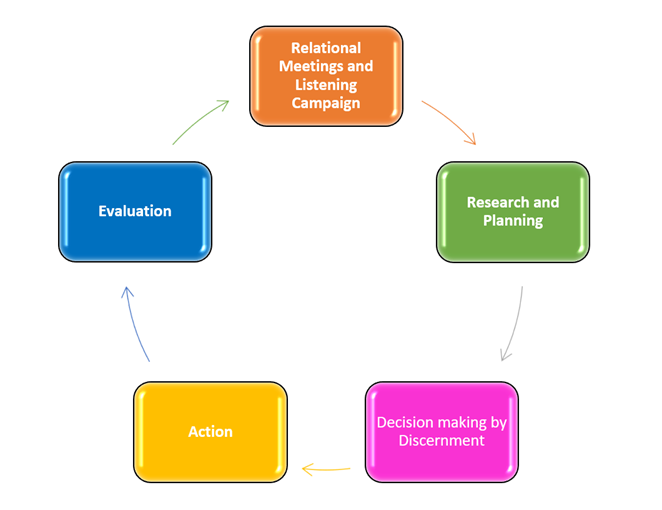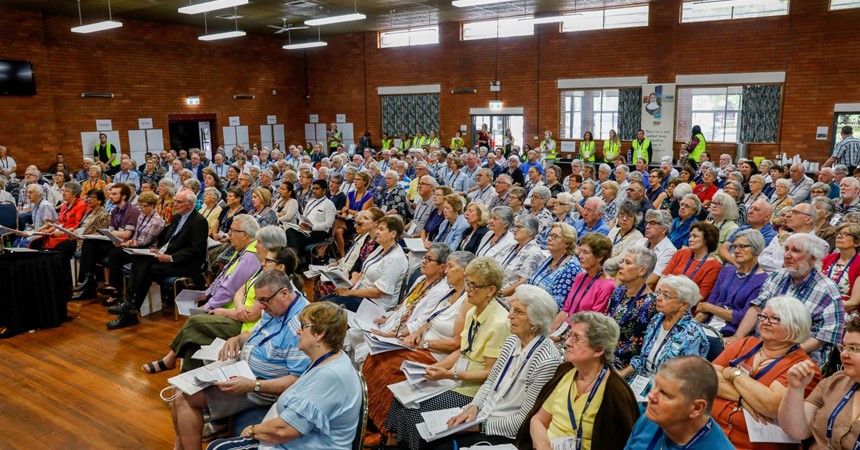There are a number of processes and procedures that need to be honoured when conducting a diocesan synod. These are listed below.
1. Sessions of Synod
- Session 1 – Celebration and Exploration - Saturday 23 November 2019
- Session 2 – Discernment - Saturday 22 May 2021 (Pentecost Sunday weekend)
- Session 3 – Implementation - Saturday 20 November 2021 (Feast of Christ the King weekend)
2. Synod Working Party
The Synod Working Party is the work of the Council for Mission (CfM), on behalf of Bishop Bill. They have been meeting monthly since 2018 in order to coordinate the many processes for our diocesan synod.
The members of this Working Party are:
Working Party Members |
Staff Assisting |
|
Teresa Brierley – Moderator, CfM Executive Secretary, Director Pastoral Ministries |
Alyson Segrott – Executive Assistant to Director Pastoral Ministries |
|
Helen Belcher – Co-chair CfM, Parishioner, Plenary Council delegate |
Jenny Harris – Administrative Assistant Pastoral Ministries |
|
Lawrie Hallinan - Co-chair CfM, Parishioner |
Rachel James – Head of Communications |
|
Michael O’Connor – CfM Member, Parishioner |
Brooke Cross – Marketing and Communications Manager |
|
Sr Patricia Egan - CfM Member, Parishioner, Religious, Connection to previous Synod processes |
Ashleigh Banks - Marketing and Communications Coordinator |
|
Ben van der Wijngaart - CfM Member, Parishioner |
|
|
Bernadette Gibson – Plenary Council Delegate, Catholic Schools |
|
|
Helene O’Neill - CfM Member, Parishioner, Family Ministry Coordinator |
|
|
Gary Christensen – Director CatholicCare |
|
|
Fr Geoff Mulhearn – Council of Priests |
|
|
Uta France – Liturgy Council |
|
The process chosen by the Synod Working Party is outlined in the diagram below:
Relational Meetings and Listening Campaign – Since the 1992/93 Diocesan Synod the diocese, through Diocesan, Regional and Parish Pastoral Councils, has been listening to the voice of the people mostly through meetings, assemblies and gatherings. A massive listening and dialogue process was also undertaken as part of the Plenary Council which resulted in the six themes which became our focus for Session 1 of our Diocesan Synod.
Research and Planning – This process is the ongoing work of the Synod Working Party which is informing the papers which will be presented during the synodal process.
Decision-Making by Discernment – discernment is our ability to listen to each other and the Spirit and by doing so we will arrive at recommendations for the way forward.
Action – planned, focused and intentional action steps will be determined at session 3 of the Synod
Evaluation – the need to critically review the effectiveness of decisions and actions will form the ongoing work of the Council for Mission.
3. Diocesan Synod Directory (manual of procedures)
This is a formal document and follows the Instruction on Diocesan Synods by the Congregation for Bishops and the Congregation for the Evangelization of Peoples (1997
The Synod Working Party has recommended that a user-friendly guide also be developed.
4. Membership of the Synod
The Diocesan Synod Members document provides guidelines for the discernment of delegates for Synod membership. The recommendation is to have a diverse, representative group of people from across the diocesan community.
Expressions of Interest for delegates will need to be submitted by 4 January 2021, then reviewed by the Synod Working Party, ensuring the balance and spread reflects the diversity of the Diocese. Names will then be submitted to Bishop Bill for his approval and invitations will be sent.
Synod Members (Delegates) will be commissioned and provided with a Formation Program in early 2021.
5. Communication Plan for the Synod
- A Diocesan Synod Website has been developed – domnsynod.com.au
- Regular communication updates with the diocesan community will take place.
6. Focus Groups for the Synod
Focus Groups form part of the Diocesan Synod Working Party and are working on the different aspects of the synod.
Synod Focus Groups:
- Foundational Guiding Principles: To develop a spiritually inspiring document that reflects the vision of how we the Church of Maitland-Newcastle will work together to further Jesus’ mission in today’s world.
- Discernment of Data: To process data relevant to the Plenary Council and Diocesan Synod that has been generated thus far within and beyond the diocese, and from that data develop recommendations for discernment by the diocesan community and in time by the Synod.
- Diocesan Directory: To compile and review all the documentation that has provided direction for the Diocese of Maitland-Newcastle since the last Diocesan Synod of 1992/93, and recommend the ongoing ratification or abrogation of that documentation.
- Governance Guiding Principles and Documentation: To develop clear documentation concerning the governance structures of the diocese, parishes and agencies and the principles on which the diocesan community is governed canonically, pastorally and civilly. There is a need to honour the principles of synodality, transparency, inclusivity, accountability, and stewardship.
- Event Planning: To develop processes for planning, coordinating and managing each of the synod sessions.
- Liturgy: To oversees the preparation of the liturgies associated with the Synod and promote prayer for the success of the Synod.
7. Diocesan Reflection Program
This will be a five-week program during Lent 2021 (17 February – 31 March). Based upon the Five Foundations of the Diocesan Planning Framework:
- Identity and Community
- Worship and Prayer
- Formation and Education
- Mission and Outreach
- Leadership and Structure
8. Reflection Gatherings with Bishop Bill
These will be held in the Easter Season 2021. It is hoped that the members of the Council of Priests and the Council for Mission will accompany Bishop Bill and join the diocesan community during these days, to participate and to actively listen.
|
Day |
Date |
Session |
Time |
Pastoral Region |
Venue |
|
Tuesday
|
April 13 |
Reflection |
2.30pm – 4pm |
Upper Hunter |
Aberdeen |
|
Mass |
5pm – 5.30pm |
||||
|
Reflection |
6pm – 8pm |
||||
|
Wednesday |
April 14 |
Reflection |
2.30pm – 4pm |
Chisholm/Vineyards |
East Maitland |
|
Mass |
5pm – 5.30pm |
||||
|
Reflection |
6pm – 8pm |
||||
|
Thursday |
April 15 |
Reflection |
2.30pm – 4pm |
Blackbutt/Port Stephens/Eastlakes/City |
Charlestown |
|
Mass |
5pm – 5.30pm |
||||
|
Reflection |
6pm – 8pm |
||||
|
Tuesday |
April 20 |
Reflection |
2.30pm – 4pm |
Northern |
Forster |
|
Mass |
5pm – 5.30pm |
||||
|
Reflection |
6pm – 8pm |
||||
|
Thursday |
April 22 |
Reflection |
2.30pm – 4pm |
Macquarie/Western |
Toronto |
|
Mass |
5pm – 5.30pm |
||||
|
Reflection |
6pm – 8pm |
||||
|
Tuesday |
May 4 |
Reflection |
2.30pm – 4pm |
Blackbutt/Port Stephens/Eastlakes/City |
Cathedral House |
|
Mass |
5pm – 5.30pm |
SHC |
|||
|
Reflection |
6pm – 8pm |
Cathedral House |
If you have any questions regarding the diocesan synod you may like to contact Teresa Brierley, Director Pastoral Ministries, Teresa.brierley@mn.catholic.org.au or phone 02 4979 1157 or 0417 885 760.

